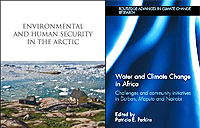Two books will launch this Thursday as part of the Institute for Research & Innovation in Sustainability’s (IRIS) third annual Research Showcase.

The launch will take place March 27, from 11am to 12:30pm, at 140 Health, Nursing & Environmental Studies Building, Keele campus. Both books are by IRIS core faculty members. Everyone is welcome to attend.
Co-edited by York biology Professor Dawn Bazely and Gunhild Hoogensen Gjørv of the University of Tromsø, Environmental and Human Security in the Arctic, is hailed as the first comprehensive exploration of why human security is relevant to the Arctic and what achieving it can mean, covering the areas of health of the environment, identity of peoples, supply of traditional foods, community health, economic opportunities, and political stability.

The traditional definition of security has already been actively employed in the Arctic region for decades, particularly in relation to natural resource sovereignty issues, but how and why should the human aspect be introduced? What can this region teach us about human security in the wider world?
The book reviews the potential threats to security, putting them in an analytical framework and indicating a clear path for solutions.Contributions come from natural, social and humanities scientists, hailing from Canada, Russia, Finland and Norway.
Environmental and Human Security in the Arctic is an essential resource for policy-makers, community groups, researchers and students working in the field of human security, particularly for those in the Arctic regions.

The second book, Water and Climate Change in Africa: Challenges and community initiatives in Durban, Maputo and Nairobi, edited by environmental studies Professor Ellie Perkins, highlights how water governance is a crucial aspect of climate change resilience because weather extremes are the main way that climate change manifests itself.
In the coming decades, countries around the world will face increasingly severe challenges related to global climate change. While the details vary from country to country, the impacts will be especially grave for marginalized people, whose access to food, potable water and safe shelter may be threatened due to fluctuations in rainfall and temperature, and to extreme weather events. Because weather extremes are the main way that climate change manifests itself, water governance is a crucial aspect of climate change resilience.
Following an overview of the ways climate change is affecting three cities in Africa, Water and Climate Change in Africa discusses the equity and climate justice implications, and then gives examples of ways in which a range of local community organizations are extending their current activities to address these challenges through innovative new programs and initiatives at the grassroots.
This approach has implications for communities worldwide; it is a process of building on existing organizations’ aptitudes and strengths in the light of local knowledge of climate challenges, and creating partnerships to build equity-enhancing new methods of protecting people’s subsistence.
For more information, visit the Institute for Research & Innovation in Sustainability website.


